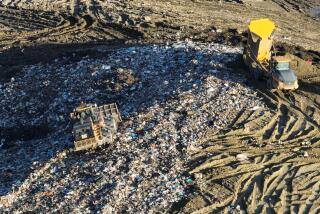Santa Clarita / Antelope Valley : Conference Targets Alternatives to Landfills
- Share via
PASADENA — Billed as a conference, it was more like a swap meet of landfill alternatives.
From an economist who said waste can be reduced by shifting market forces, to a Victorville firm touting “pyro-conversion,” a method of melting waste, the Landfill Alternatives Save Environmental Resources conference on Friday had it all.
Although they varied in approach, more than 100 conference attendants, who included city officials and environmentalists, had the same goal: to move away from landfills as a way of managing waste.
“For every landfill that we cap off, future generations will have a Pandora’s box that will have to be opened,” said Sal Luster, president of the Goldstar Corp., which has developed a system that he said “takes waste and thoroughly degrades it, without direct flame and is nontoxic.”
The keynote speaker, Allen Hershkowitz of the New York-based Natural Resources Defense Council, offered no high-tech gizmos but a market strategy that would price consumer products not only by how much they cost to produce, but also how much they cost to throw away.
That, Hershkowitz argued, would encourage manufacturers to reduce wasteful packaging and consumers to buy more recyclable and reusable goods, reducing the amount thrown away and the $30 billion the U.S. spends annually on garbage disposal.
“The more waste you make, the less efficient you are, and the more efficient you are, the less waste you produce,” Hershkowitz said. “The U.S. today is not a shining example of efficiency.”
As it is, federal regulations on imports and subsidies on virgin materials discourage manufacturer’s use of recycled goods, Hershkowitz said. Companies are not held responsible for the total cost of their products.
“I can market a diamond ring in a refrigerator box because I don’t have to worry about the cost of throwing the package away,” Hershkowitz said. “We have to start telling the consumer product companies that they have to pay for these things.”
Under Hershkowitz’s proposal, companies would report how much material of a particular kind is used in their products and the cities would say how much it costs to manage that material. The costs of managing the waste would then be passed on to the manufacturer and the consumers of the product.
Under the current system, everybody pays for disposing of the product, Hershkowitz said. Under the new system, which is already in place in Germany, the Netherlands and Sweden, only the person who uses the product pays.
More to Read
Sign up for Essential California
The most important California stories and recommendations in your inbox every morning.
You may occasionally receive promotional content from the Los Angeles Times.













